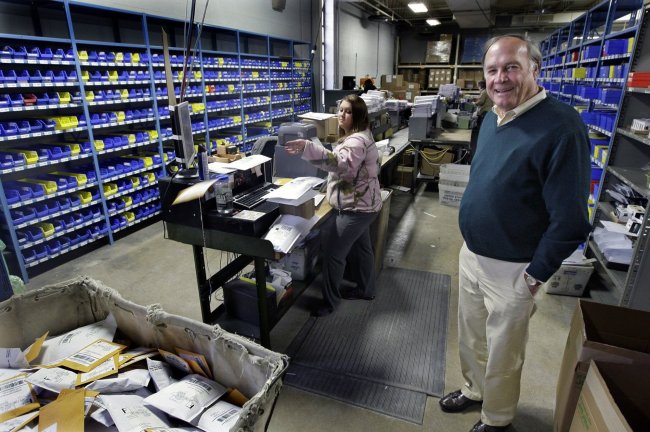MILWAUKEE ― You might have thought rubber stamps and embossers had gone the way of buggy whips and common sense, but not so at Schwaab Inc., which has been making stamps and embossers for 133 years.
The Wauwatosa, Wisconsin, firm, at one time the world’s largest manufacturer of watch fobs, has added a third work shift to meet the growing demand from Internet sales.
The company once known for having a small army of door-to-door sales people now generates more than a third of its business from websites like Amazon.com and rubberstamp.com.
One of the biggest changes is that people want products such as rubber stamps and name badges right away, said Douglas Lane, president of the company that once engraved coins for the U.S. Mint.
“People have come to expect virtually instant gratification,” Lane said.
A business this old has many colorful stories, such as the time when two employees loaded a horse-drawn wagon with stamp-making equipment and traveled through the Midwest soliciting orders one day and making stamps on the wagon the next day.
Once a fixture in downtown Milwaukee, Schwaab made Wisconsin license plates until about 1918, when the business was awarded to the state prison at Waupun. For decades it has made signature stamps for athletes and entertainers, including West Allis, Wisconsin-born pianist Liberace.
 |
Doug Lane, president of Schwaab Inc., is photographed in the shipping area of the business in Milwaukee on March 11. (Milwaukee Journal Sentinel/MCT) |
Stamps and embossers are still important to Schwaab, the average sale of which is about $50, helping the company to generate roughly $20 million in revenue last year.
Banks, courts and government agencies use inked stamps and embossers for official documents.
Moreover, the industry’s products recently attracted the attention of federal authorities because forgers were turning to stamp makers for tools to make false identification cards and phony documents.
“Unfortunately, that’s still very prevalent. The industry works closely with the Department of Homeland Security to prevent that kind of stuff, but it’s a never-ending task,” said David Hachmeisterv, publisher of Marking Industry Magazine, a 107-year-old publication based in Elmhurst, Illinois.
“We have had a pretty good success rate in catching people who were trying to do something illegal. When something seems fishy, the stamp makers check with the government,” Hachmeister added.
Schwaab makes stamps and embossers for some of the largest banks in the country. It also sells stamps to people who want to jazz up their personal stationary.
These days, there’s greater use of pictures and artwork.
“People like to do something pretty on their Christmas card envelope or that sort of thing. The stamps fulfill the need,” Lane said.
Sales in the rubber stamp industry have declined about 5 percent a year, Lane said. Yet, Schwaab’s stamp sales in 2013 were up more than 9 percent from Internet traffic, new products and increased market share.
“In the early days, I was perfectly willing to break even on the Internet segment of our business, just to grow it,” Lane said. “And now it’s the largest division of our company.”
The industry took a flogging in the recession, with many manufacturers going out of business or merging with other companies. It’s also taken a hit from electronic documents, which have replaced ink on paper.
Mostly what’s left are small shops that cater to local customers, and large companies like Schwaab that have local and national sales accounts.
“The guys in the middle, who were doing about $200,000 to maybe a $1 million a year in sales, are kind of gone,” Hachmeister said. “And virtually anybody who’s successful now is using the Internet.”
Manufacturers have turned to new technologies, including one that makes a stamp with a photo-exposure process.
Schwaab, which has five manufacturing plants, has broadened its product portfolio to include items such as name badges for airlines. It also prints business cards and sells a variety of other items such as price-marking guns, magnets, signs and door knockers.
Even with Internet-based sales, Schwaab still has about 45 salespeople who make door-to-door calls on clients like banks and law offices, down from more than 200 salespeople years ago.
The company, which is 100 percent family-owned, has made police and fire department badges, pet tags, ashtrays, stencils and seals. It has invested heavily in new technologies, such as lasers, to make rubber stamps.
“We see what other companies are doing in our industry, and I think we are up there with the best,” Lane said.
By Rick Barrett
(Milwaukee Journal Sentinel)
(MCT Information Services)








